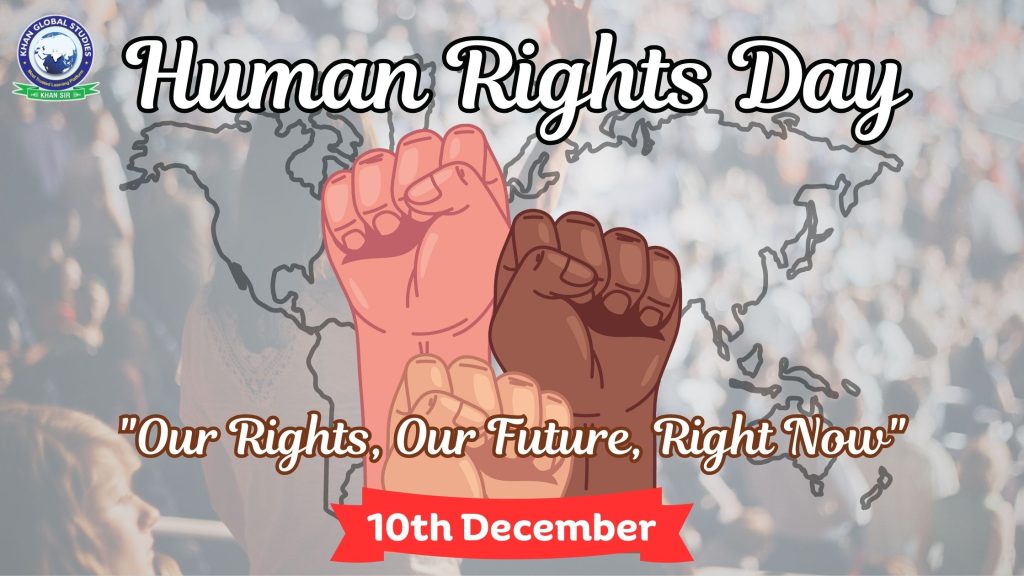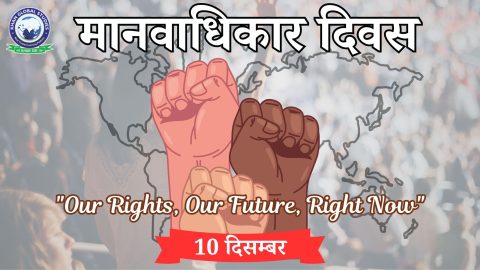Human Rights Day is observed on December 10 each year to commemorate the adoption and proclamation of the Universal Declaration of Human Rights (UDHR) by the United Nations General Assembly on December 10, 1948. This declaration was the first global enunciation of human rights and one of the United Nations’ first significant achievements. The formal establishment of Human Rights Day took place during the 317th plenary meeting of the General Assembly on December 4, 1950, through Resolution 423(V), which invited all member states and organizations to celebrate the day in their own ways.
The day is usually marked by high-level political conferences and meetings, as well as cultural events and exhibitions related to human rights. Additionally, December 10 is when the United Nations Human Rights Prize and the Nobel Peace Prize are awarded. Many governmental and non-governmental organizations organize special events to commemorate this day.
The purpose of Human Rights Day is to promote respect and awareness for these rights globally. Various programs, conferences, and cultural activities are held to highlight issues related to human rights. Furthermore, the United Nations recognizes this day by presenting prestigious awards like the United Nations Human Rights Prize and the Nobel Peace Prize.
Theme of Human Rights Day 2024
The theme for Human Rights Day 2024 is “Our Rights, Our Future, Now,” highlighting the urgency of taking swift action in human rights education. This year’s campaign focuses on showcasing the real-world impact of human rights through successful examples and solutions. The goal is to inspire people to take action, dispel misconceptions, and further strengthen the global human rights movement.
History
In 1948, on the occasion of Human Rights Day, the United Nations General Assembly adopted the Universal Declaration of Human Rights. Subsequently, in 1950, the General Assembly passed Resolution 423(V), calling for the observance of December 10 as Human Rights Day every year.
This day gained significant popularity, as evidenced by the advance demand for nearly 200,000 commemorative stamps issued by the United Nations Postal Administration in 1952.
When the Declaration was adopted, it was proclaimed as a “common standard of achievement for all peoples and all nations,” urging individuals and societies to strive for its recognition and implementation through progressive measures at both national and international levels.
Although the Declaration is not a legally binding document, it has inspired over 60 human rights instruments, which collectively form the foundation of international human rights standards today.
Significance
The significance of Human Rights Day lies in its reminder that every individual deserves freedom, equality, dignity, and rights. It highlights the struggles and efforts of nations and individuals working to protect human rights. This day emphasizes that human rights are not merely a legal document but a way of life, ensuring equal opportunities, security, and respect for everyone.
Contemporary Relevance
Even today, poverty remains the greatest challenge to human rights worldwide. It is essential to view and address poverty as a human rights obligation. In 2006, UN High Commissioner for Human Rights Louise Arbour stated, “Poverty eradication is an achievable goal.”
In 2008, on the 60th anniversary of the Universal Declaration of Human Rights, the UN Secretary-General launched a year-long campaign to raise awareness about people’s rights.
Date Variations in Other Countries
- In South Africa, Human Rights Day is observed on March 21 in remembrance of the Sharpeville Massacre of 1960, which occurred during protests against apartheid.
- In Kiribati, Human Rights Day is celebrated on December 11.
United Nations Human Rights Council (UNHRC)
The UNHRC is an inter-governmental body within the United Nations tasked with promoting and protecting human rights worldwide. Established in 2006, it comprises 47 member states elected by the UN General Assembly. The council reviews human rights violations and holds countries accountable for their actions.
National Human Rights Commission (NHRC)
India’s National Human Rights Commission (NHRC) was established in 1993 with the aim of safeguarding and promoting human rights in the country. The NHRC investigates complaints of human rights violations and provides recommendations to the government for improving human rights practices.
Thus, Human Rights Day serves as an annual reminder of our rights and inspires us to ensure that every individual has the right to live with equality and justice.
What are the 30 Human Rights?
Under the Universal Declaration of Human Rights (UDHR), 30 rights are granted to protect the dignity and freedom of every individual. These rights aim to ensure equal opportunities for all without discrimination. The rights are as follows:
- Right to Freedom and Equality (Article 1): Every person is entitled to freedom and equality, and all humans are born with equal rights.
- Freedom from Discrimination (Article 2): No person should face discrimination on any grounds such as race, religion, gender, or nationality.
- Right to Life, Freedom, and Security (Article 3): Every individual has the right to life, liberty, and security, and no one can be unlawfully imprisoned.
- Freedom from Slavery (Article 4): No one can be enslaved, and any form of exploitation through slavery or trafficking is illegal.
- Freedom from Torture or Cruel Treatment (Article 5): No one shall be subjected to torture or cruel, inhumane, or degrading treatment or punishment.
- Right to Recognition Before the Law (Article 6): Everyone is entitled to equal recognition before the law.
- Equal Protection Under the Law (Article 7): Everyone has the right to equal protection under the law and cannot be excluded from legal safeguards.
- Right to Effective Legal Remedy (Article 8): Everyone has the right to seek effective legal recourse if their rights are violated.
- Freedom from Arbitrary Arrest or Detention (Article 9): No one can be arrested or detained without valid reasons.
- Right to Fair and Public Hearing (Article 10): Everyone has the right to a fair and public hearing to ensure justice.
- Presumption of Innocence (Article 11): Every person is presumed innocent until proven guilty.
- Right to Privacy and Protection from Attacks (Article 12): Everyone has the right to the protection of their personal life and family privacy and freedom from unlawful attacks.
- Freedom of Movement and Residence (Article 13): Everyone has the right to travel and reside freely in any location.
- Right to Seek Asylum (Article 14): If someone faces persecution in their country, they have the right to seek asylum in other countries.
- Right to Nationality (Article 15): Everyone has the right to a nationality and cannot be arbitrarily deprived of it.
- Right to Marriage and Family (Article 16): Every person has the right to marry and start a family.
- Right to Own Property (Article 17): Everyone has the right to own and manage property.
- Freedom of Thought, Conscience, and Religion (Article 18): Every person has the right to choose their thoughts, beliefs, and religion freely.
- Freedom of Opinion and Expression (Article 19): Everyone has the right to express their opinions freely and access information.
- Freedom of Peaceful Assembly and Association (Article 20): Everyone has the right to assemble peacefully and form associations.
- Right to Participate in Government (Article 21): Every person has the right to participate in their country’s government and elections.
- Right to Social Security (Article 22): Everyone has the right to social security to meet their basic needs.
- Right to Work and Fair Employment (Article 23): Every person has the right to work under fair conditions and receive equitable wages.
- Right to Rest and Leisure (Article 24): Everyone has the right to rest and take breaks from work.
- Right to Adequate Living Standards (Article 25): Every person has the right to an adequate standard of living, including food, clothing, shelter, and healthcare.
- Right to Education (Article 26): Everyone has the right to education, which aims to promote human development and the propagation of rights.
- Right to Cultural Participation and Intellectual Property Protection (Article 27): Everyone has the right to participate in cultural life and protect their intellectual creations.
- Right to a Social and International Order (Article 28): Everyone has the right to a social and international order that ensures the realization of their rights.
- Duties to the Community (Article 29): Every person has duties towards their community to uphold respect and justice in society.
- Protection Against Acts That Undermine Rights (Article 30): Every step must be taken to safeguard individuals and groups from acts that infringe upon their human rights.
These 30 rights ensure equal and independent living for all individuals and protect their fundamental rights.
Key Activities on Human Rights Day
- Conferences and Meetings: Various governmental and non-governmental organizations organize conferences and meetings focused on human rights on this day.
- Education and Awareness Programs: Schools, colleges, and organizations host programs to educate people about human rights.
- Special Awards: The United Nations and other organizations honor individuals who have made outstanding contributions in the field of human rights, such as the United Nations Human Rights Prize and the Nobel Peace Prize.
- Art and Cultural Events: Messages related to human rights are conveyed to the public through cultural programs and exhibitions.
Conclusion
Human Rights Day is not just a date but an inspiration for humanity. It reminds us that every individual should be granted equal rights without discrimination. Protecting and promoting human rights is everyone’s duty, so we can build a just and equitable society.
FAQs
- Why is Human Rights Day celebrated?
Human Rights Day is celebrated on December 10, as on this day in 1948, the United Nations General Assembly adopted the Universal Declaration of Human Rights. - Is Human Rights Day a public holiday?
It is not a public holiday in many countries, but it is observed as an important day by the United Nations and other organizations.
- What activities take place on Human Rights Day?
High-level conferences, cultural programs, award ceremonies, and awareness campaigns are organized to commemorate this day.
- Is the Universal Declaration of Human Rights legally binding?
No, the Universal Declaration of Human Rights is a guiding document and is not legally binding. However, it has served as the foundation for numerous international treaties and laws worldwide to uphold human rights.
- Are there any awards associated with Human Rights Day?
Yes, prestigious awards such as the United Nations Human Rights Prize and the Nobel Peace Prize are conferred on this day.





